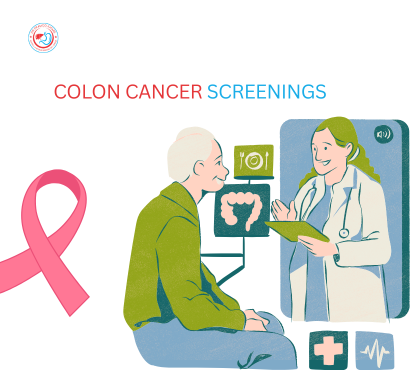Colon cancer (also known as colorectal cancer) is increasingly diagnosed in India. Lifestyle and diet changes—more red meat, less fibre, sedentary habits—have led to earlier onset than previous generations. The good news? With timely screenings, colon cancer is one of the most preventable and treatable cancers. Let’s dive into why screenings matter, who needs them, what procedures are involved, and how procedures are accessible in the Indian healthcare landscape.
2. What is Colon Cancer?
The colon and rectum are parts of the large intestine. Almost all colon cancers begin as polyps—small growths on the inner lining—that can become cancerous over time. Screening detects these polyps early—or even before they turn malignant—making early intervention life-saving.
3. Why Screenings Are Critical
- Early Detection Saves Lives
- Stage I survival rate can reach >90%. Advanced-stage drops below 15%.
- Polyps Removal Prevents Cancer
- Catching polyps during colonoscopy helps avoid cancer altogether.
- Increasing Young-Onset Cases
- India sees rising colorectal cancer in people under 50—urgent need for screening.
- Improved Quality of Life
- Early-stage treatment is far less invasive.
- Cost-Effective
- Preventative screening (₹1,000–₹3,000) is far cheaper than late-stage treatment (lakhs).
4. Who Should Get Screened?
- Average-risk adults (no symptoms, no family history):
- Begin at 45 years old, every 5 years (colonoscopy) or every 2 years (stool-based).
- Higher-risk groups (family history, polyps, IBD):
- Begin at 40 years or 10 years before a relative’s diagnosis.
- Screening every 3 years or as per specialist guidance.
- Symptomatic individuals (bleeding, change in bowel habit, fatigue):
- Seek medical attention immediately.
5. Screening Methods Available in India
- Fecal Occult Blood Test (FOBT) / FIT – home stool test, ₹300–₹800
- Stool DNA Test – more accurate, ₹5,000–₹8,000
- Sigmoidoscopy – checks lower colon, ₹3,000–₹10,000
- Colonoscopy – gold standard, ₹5,000–₹15,000 or higher in private hospitals
- CT Colonography (Virtual Colonoscopy) – ₹10,000–₹20,000
6. Understanding Colonoscopy
- Preparation: Bowel clearing via laxatives before
- Procedure: 15–30 min using a flexible camera
- Findings: Polyps removed immediately; biopsy if needed
- Sedation: Optional mild sedation to ease discomfort
- Recovery: Normal activities resume after a day
7. Post-Screening Follow-Up
- Normal results: Repeat colonoscopy in 5 years
- Polyps found:
- Low-risk: Repeat in 3–5 years
- High-risk: Repeat in 1–3 years
- Cancer diagnosed: Further staging scans (MRI/CT) and treatment planning with oncology team
8. Prevention Through Lifestyle
- High-fibre diet: Whole grains, fruits, vegetables
- Limit red & processed meats
- Control body weight
- Exercise regularly (30 mins most days)
- Quit smoking and limit alcohol
- Stay hydrated
10. Colon Cancer in India—Current Scenario
- India records ~12 cases per 100,000 population yearly; cases rising
- Govt awareness initiatives (e.g., “Quit Tobacco” campaign)
- Accessible screenings at public hospitals like AIIMS, CMC, Tata Memorial
- Telemedicine reaching rural populations
11. When Not to Delay Screening
- Rectal bleeding or occult blood in stools
- Persistent diarrhea or constipation
- Unexplained weight loss or fatigue
- Iron-deficiency anaemia
12. Emotional & Social Impact
- Fear and stigma around colon cancer
- Fear of colonoscopy—myth busting is essential
- Post-treatment quality of life is excellent—most return to normal activities
13. Barriers to Screening & Solutions
- Lack of awareness: Education drives local community talks
- Anxiety: Doctors need to explain procedure comfort
- Cost concerns: Govt hospitals offer subsidised options
- Logistics: Day-care colonoscopy, local lab collection kits simplify access
Colon cancer rates are rising in India, but mortality can be dramatically reduced through early detection and polyp removal. A simple, routine screening can be life-saving. Combine this with healthy lifestyle habits for best prevention. Don’t wait—for yourself and your family, take action today. Encourage conversations, share this guide, and prioritise colon health.
FAQs
Q1. At what age should Indians start colon cancer screening?
Average-risk individuals should start at age 45. Those with family history may need screenings earlier, often starting at 40 or 10 years before a relative’s diagnosis.
Q2. Is colonoscopy painful?
No. Mild sedation is typically used, and most patients report feeling comfortable with minimal discomfort. The prep is more of an inconvenience than the procedure.
Q3. Can diet change prevent colon cancer entirely?
Diet rich in fibre, fruits, and vegetables greatly lowers risk, but screenings are vital because polyps can still develop despite healthy habits.


